What Are Editorial Links and Why Are They Good for SEO?

We all know that links are critical for SEO, but did you know that there are different kinds of links? I'm not just talking about inbound versus outbound links or internal versus external links. When a website links to you, the placement and type of that link have a huge amount of impact on what kind of value it has.
Among the different kinds of links are editorial links, and they're by far the best kind of links to get. Today, I wanted to talk more about them; what they are, why they're valuable, and how to get more of them.
What Are the Different Kinds of Links?
To start, let's talk about the different kinds of links you can receive.
A link pointing at your site basically has three defining attributes.
- The placement of that link on the page.
- The context and relevance of that link.
- Any link attributes attached to that link.
These three attributes come together as modifiers to the "link juice" that the site passes on through its links.
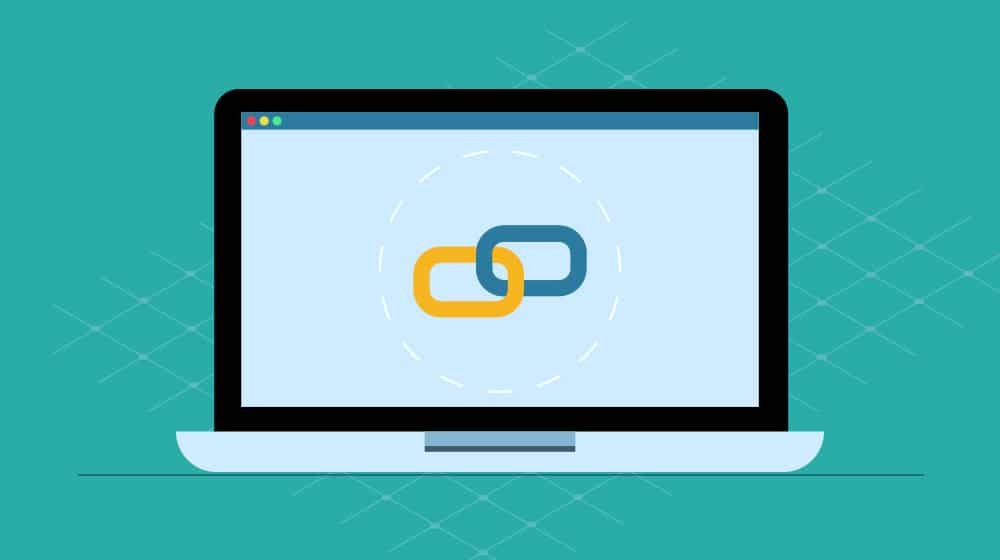
Link attributes are meta tags for the links. These are things like rel="UGC" or rel="sponsored," which tells the search engines some context about the link. Usually, these are contextual descriptors that remove value from a link; if a link is UGC, it means the page owner didn't put it there, so it shouldn't be assigned much, if any, value. Similarly, if a link is sponsored, it means they were paid to put it there, so it should have less value.
Context and relevance encompass the respective content of the pages. If you run a food blog, getting a link from a plumbing blog probably isn't very useful, but getting a link from an ingredient manufacturer probably is. The more closely related the topics of the sites are, the more valuable the links tend to be.
Placement simply refers to where on the page the link is posted. Links in navigation, sidebars, and footers are less valuable than links in page content. The more easily overlooked the link placement, the less valuable it generally will be.
So, what are the different kinds of links, and how do they fall in this spectrum?
Navigational links are generally links in the navigation of a site. This usually means the top nav bar, but it can also be in a sidebar or can be in a footer. They're also known as structural links because they're part of a site's fixed structure.
On my blog, every page has buttons at the top for things like my blog management service, my company testimonials, and my contact page. These are navigational links. Similarly, at the very bottom of the page, you can see things like the About Us link, the Code Snippets link, and the Terms and Conditions link. Again, all structural.
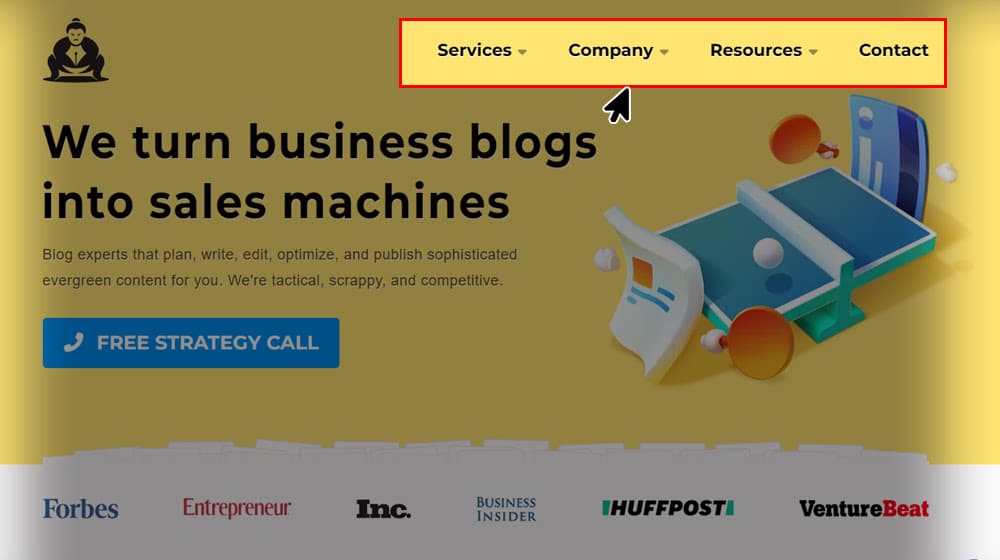
90% of the time, navigational links are internal links. Everything I listed points to other parts of my site. But, sometimes, sites include links to other sites in their navigation. Many WordPress sites have a link to WordPress itself under a "powered by WordPress" link, for example. Theme designers often get credit links of that sort. Sometimes, blogs will also include links to third-party sites in their navigation. Webrings, which used to be really common, are one such example.
Structural links like these aren't given much value because they're present on every page on a site, in a position that isn't given much relevance to the context of the page. A link in my footer would appear across hundreds of blog posts across tons of widely varied topics, and there's no way it would be relevant to all of them. So, those links have very little SEO value.
Advertorial Links
Second up, we have advertorial links. In this case, I'm drawing a distinction between ad links and links that may be sponsored but aren't directly ads. Those are under sponsored links below.
Advertorial links are usually generated by ad code and inserted on the page based on the visitor's information. When you have display ads, Google ads, or other ads running on your site, the links injected into their ad units are advertorial links.
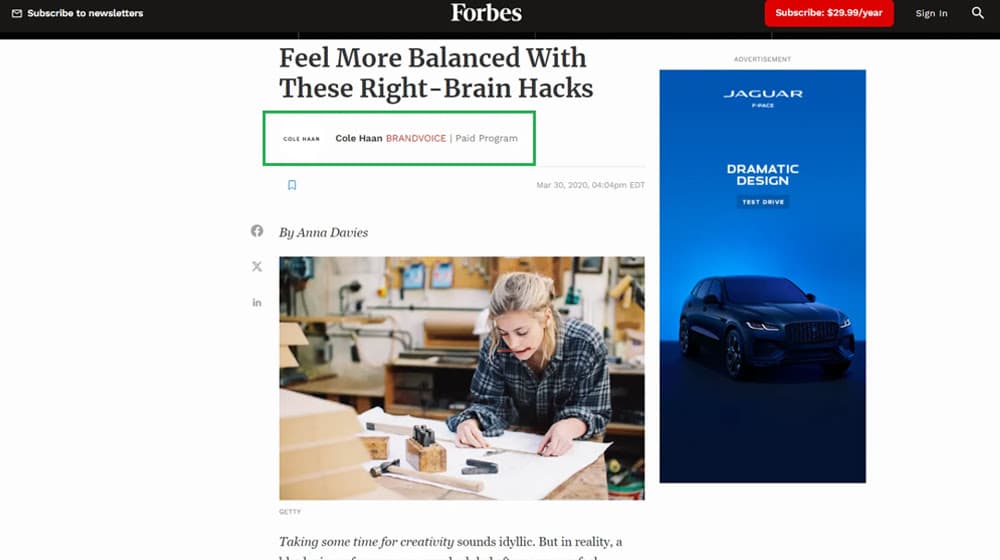
Generally, because of how these are generated by the ad code and not inserted by the site owner, they have no value for SEO. This is true both because they're advertising links and because they're dynamic. Search engine bots don't even run the ad scripts for indexing purposes, so those links are functionally invisible.
Sponsored Links
You can consider these a subset of advertorial links if you want, but there's one big important difference: they're static. Sponsored links are links you insert into your content rather than links that are generated by ad scripts. Affiliate links are the biggest example.
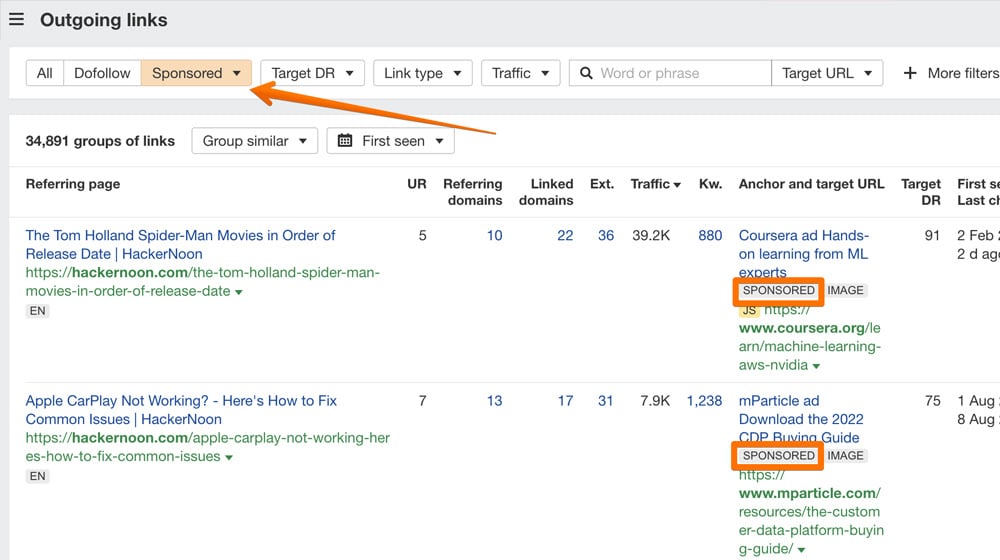
The best practice is to tag these links with rel="sponsored," so Google and the other search engines know that you're getting some form of compensation out of them. It might be affiliate links, or it might be links in paid content, or something else of the sort; it doesn't matter.
What happens if you don't include that tag? Well, it's possible that they'll slip through and count as editorial links. It's also possible that it's clear enough from context that they're sponsored, and the search engines will treat them as such anyway. In very rare cases, it can even earn you a penalty, though you generally have to abuse them a lot to have that happen.
User-Generated Links
Any time you have links in a space where users can post content without your approval – and often, even with your approval – those links are treated as user-generated links. This includes links in web forum posts, links in comment sections, and so on. The link attribute rel="UGC" covers this kind of link.
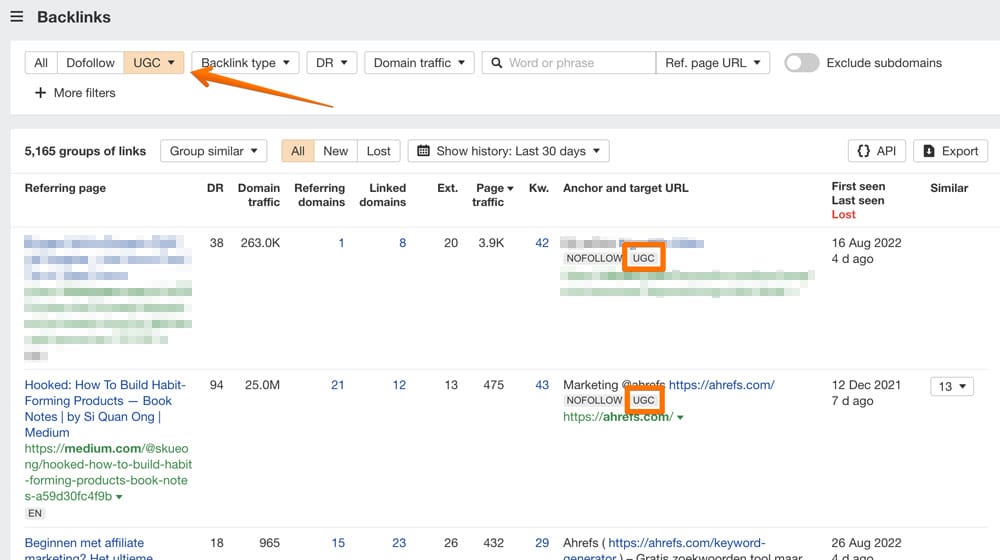
These links are usually pretty obvious to search engines, so while the UGC tag is nice and a best practice, it might not always be necessary. The links are also pretty valueless because user-generated content is rife with spam, as anyone who has run a blog for more than ten minutes and looked at the comments knows.
Editorial Links
Now we get to the meat of the issue: editorial links. What are editorial links? In a sense, anything not covered above.
Editorial links are links in the content of blog posts and other major pages that are relevant to the content of the post and that have value to the reader. They might be links to studies you cite, links to further reading on a topic, links to the source of quotes, and the like.
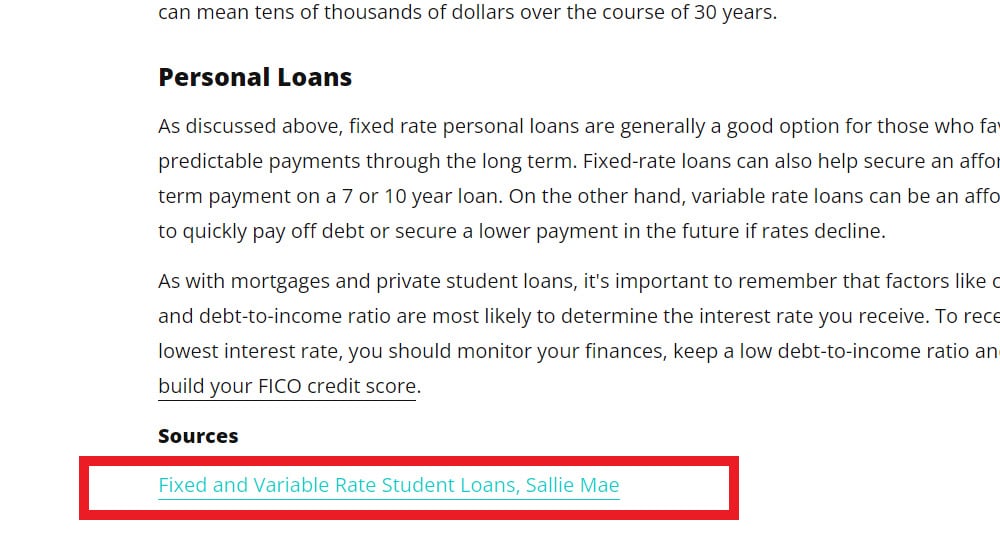
Editorial links can be natural – meaning they just appeared – or outreach-based links that you asked for. There are all kinds of ways to get links by asking for them, from guest contributions to broken link building, but the end result is basically the same.
The exceptions are if the links are paid for – in which case they'll be sponsored links – or if they're tagged with a nofollow attribute, which turns an editorial link into a low-value link.
Interestingly, nofollowed links aren't completely valueless because they can still refer users and gain you traffic. They just don't give you any SEO value, which is why they're often thought of as valueless.
What Makes Editorial Links Special?
Remember how I described what makes a link valuable? Editorial links are the best possible placement of a link on a page – in the content – and generally have the strongest relation between the content on the linking page and the content of the linked page.
Editorial links are special because they're a sign that the owner of the linking site believes in or trusts the content of the site they're linking to. There are many ways to make a link worth less, and none of them are applied to the editorial link. No UGC, no Sponsored, no NoFollow; just a strong link to relevant content.
They are, simply put, the most valuable links you can receive from a given domain.
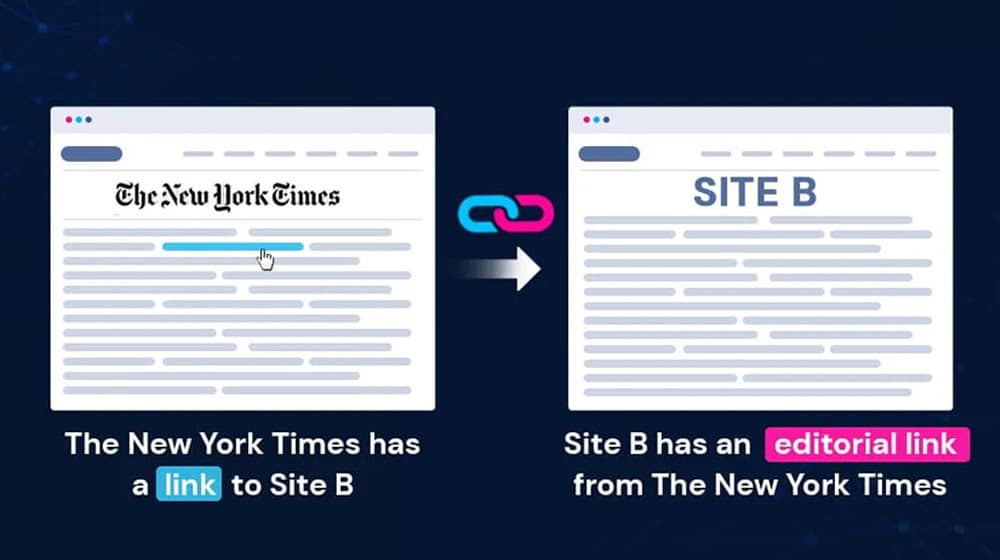
Of course, not all editorial links are created equal. Editorial links from a small business blog aren't going to be as valuable as editorial links from a big-name brand in your niche. Editorial links on a page that only has 3-4 links are going to be more valuable than editorial links on a Top 100 list. Editorial links above the fold are a little bit more valuable than editorial links below the fold.
Generally speaking, however, editorial links are better than any other kind of link. Whenever you talk about link-building or link-earning techniques, editorial links are the goal.
How to Get More Editorial Links
As a site owner, one of the best things you can do to grow your site is to gain more high-quality editorial backlinks. The question is how.
Perform Guest Blogging and Other Outreach
Outreach is simply the act of reaching out (get it) to site owners and asking for links. Obviously, it doesn't work if all you do is ask for links in unsolicited emails. No site owner in their right mind is going to listen to that. Usually, you need to reach out with a good reason why the site owner should consider linking to you.
One of the most common is guest blogging. You pitch an idea for the recipient's blog, and if they accept, you write great content for them, and when they publish it, you get a link. The downside is that guest blogging was so widely abused that many bloggers today won't allow you to include links or will label them as nofollow if you do.

Other forms of outreach might include:
- Responding to open calls for experts.
- Using link-focused expertise sites like all of the Connectively alternatives.
- Writing content as a direct response to a blogger's pieces and sending it to them to read.
Outreach can be hard to leverage to get strong editorial links due to marketer skepticism and the nofollow tag, but when you pull it off, it's great.
Create Link-Bait Content
One of the most common options is the most passive, and it's just "write excellent content people want to link to." It doesn't have to be a pillar post, but pillar posts have the most generic value in one space, so they garner the most attention.

The goal is to produce high-quality, evergreen, resource-heavy, or information-heavy posts. These have enough value that other site owners would want to direct their traffic to them. They can be top lists of resources, guides to solve a common problem, or case studies. As long as they're good enough that people want to link to them, it works.
Try Broken Link Building
I mentioned this one before, and it can work, but it's a tricky strategy.

Basically, it works like this:
- Scan the web for posts on other sites that rank well and have traffic.
- Look for links on those posts that lead to broken or removed pages.
- Create content that would fill the need the now-missing content filled.
- Send a message to the site owner informing them of the broken link and the replacement.
- Hope the site owner replaces the broken link with your link, rather than just removing the link or finding their own alternative.
Each step is pretty labor-intensive, it has a fairly low success rate, and some people consider it a gray hat technique. It's not against any rules, and as long as your content is good enough there's no reason not to try it, but I often think the effort is too high for the returns when you could be doing other forms of link building instead.
Put Your Content in Front of Other Site Owners
You can get editorial links if site owners aren't aware of your content. It's a catch-22 of sorts: since links give you SEO value and ranking to get you visibility, but you need visibility to get links, it cycles back around.

You can get your content in front of bloggers in various ways. Leave a comment on a relevant post talking about a post you wrote on the topic. Post on Reddit about it. Share it on social media where site owners hang out. In rare cases, a cold email can even work, though then you're back to outreach.
Use a Link Earning Service
One of the best options is, as always, to let an expert handle it for you. In this case, I'm that expert. My backlink earning service focuses not just on building backlinks, but earning them.
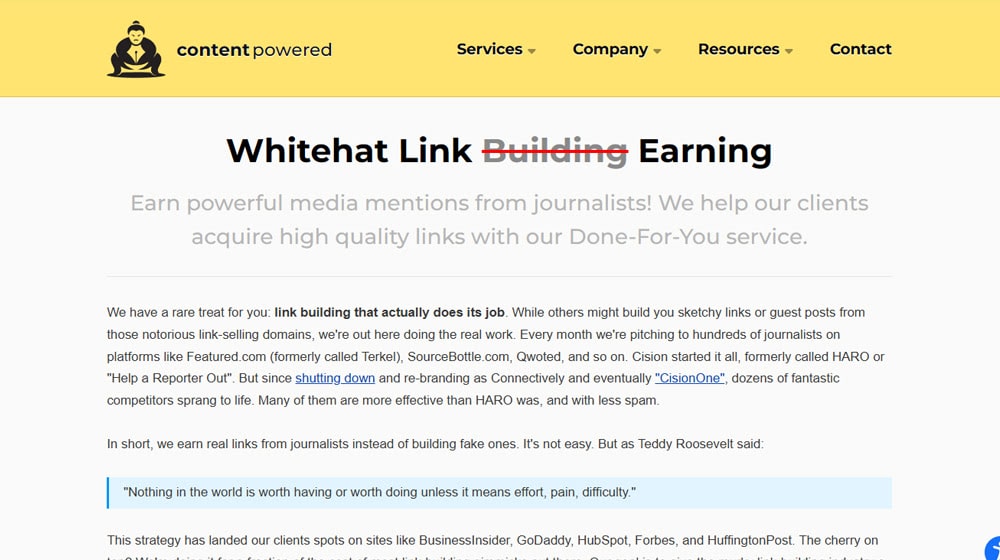
You can read more about how it works on the service page or even drop me a line to talk about it directly. Most of the links I earn for you are high-quality editorial links, and they're all valuable.










Comments